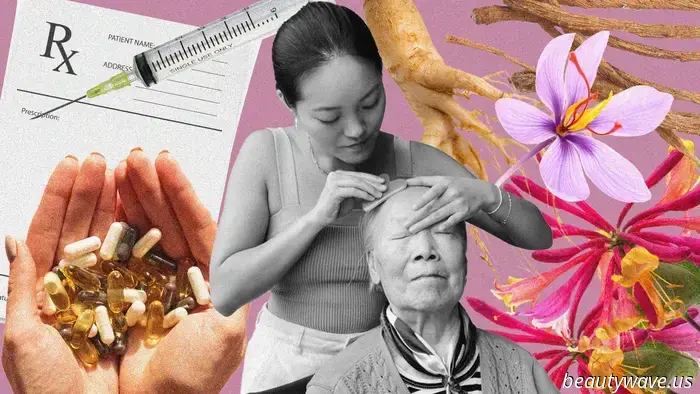
For centuries, Eastern medicine has always been considered a primary practice rather than an "alternative."
Stephanie Zheng's Instagram comments are considerably less bold compared to the early days of Mount Lai, a skincare brand inspired by the rituals of her grandmother involving gua sha and jade rolling. "At the start, we received a lot of comments like, 'Oh, it's just a rock. Oh, that doesn't work. Oh, it's a scam,'" recalls the licensed aesthetician. "When people are unfamiliar with the practice and its workings, they're quick to dismiss it." Nowadays, as Western audiences become more versed in the transformative effects of gua sha, she thankfully notices fewer of these dismissive comments. (Though, there might still be a few critics lurking behind anonymous usernames.) However, apart from algorithmic trends, a slight—so subtle it can go unnoticed—tendency exists that undermines many ancient Eastern practices (including gua sha, acupuncture, breath work, herbal remedies, and others that have stood the test of time). While people may not label them a "scam," they may refer to them as "new age," "woo-woo," or the seemingly harmless term: "alternative medicine." Language holds strong power, and such phrases can act as subtle jabs, implying that Eastern medicine lacks credibility, despite being one of the most time-honored and established healthcare systems worldwide. For thousands throughout history, Eastern medicine has not been "alternative"—it has been the primary form of medicine. So why would we, consciously or subconsciously, regard it as unserious?
According to board-certified dermatologist Asmi Berry, DO, FAAD, Western medicine focuses on results—taking pills to treat symptoms—while Eastern medicine does not emphasize performance in the same way. This creates a clear distinction: "We see Western [practices] as medicine and ancient practices more as wellness," she points out. To clarify, neither I (nor Berry) is suggesting that we should dismiss life-saving drugs, treatments, and procedures; instead, we should appreciate both Eastern and Western medicine as valuable and comprehensive healing systems. "Both my grandparents were Ayurvedic physicians, and my father was a cardiologist trained in the Western system. So, I grew up experiencing both," Berry continues. "In my practice, I say, 'Okay, this is your condition. Here's the Western medicine to manage it quickly and eliminate symptoms, but let's also incorporate these ancient practices to prevent recurrence after we've addressed it with the quick solution.'"
Eastern medicine indeed produces results—though perhaps not as swiftly as one might expect in the West, the outcomes are potent and work synergistically with the body. "Traditionally in China, you would visit your acupuncturist in anticipation of getting sick," shares board-certified doctor of Chinese medicine and licensed acupuncturist Debbie Kung, DAOM, LAc. "So if I wanted to avoid falling ill in the fall, I would start sessions in the summer to strengthen my immune system, utilizing cupping and herbal medicine." Eastern practices like traditional Chinese medicine (TCM) and Ayurveda respect the body's natural healing cycles, acknowledging that not everyone follows the same timeline. "Eastern medicine is bespoke. We treat your body based on how you present at the moment you arrive and your state at that specific time," Kung explains. "If you're coming to us very stressed or with health issues or trauma, it could take longer to see results, hence requiring more sessions."
This does not mean one should adopt a "more is more" philosophy towards Eastern modalities. In fact, Kung indicates that most TCM practitioners tend to be conservative in prescribing treatments, especially herbs. Yes, they are all-natural, but herbs are still medicine and should be handled with care. For example, ashwagandha, an herb known for reducing stress and anxiety symptoms, can have the opposite effect on some individuals. Ginseng, deeply rooted in TCM, offers antibacterial properties and can bolster immune function. "Saffron is possibly my favorite [Ayurvedic herb] because of its skin benefits and its remarkable mood-lifting properties," mentions Michelle Ranavat, founder of Ranavat. The takeaway is that herbal medicine possesses significant advantages, but it's essential to recognize it isn't suitable for everyone. "[Herbal medicine] is indeed medicine. Like pharmaceutical drugs, there are correct and incorrect ways to use it, along with potential side effects if misused," Berry concurs. Some individuals may find ashwagandha exacerbates their anxiety, while Kung explains that ginseng could be ill-suited for those who naturally have a warm constitution. This isn't to diminish the efficacy of these herbs; rather, it underscores the need to understand personal health requirements and to treat herbs as legitimate therapies rather than merely selecting various nootropics (which, when scrutinized, often happen to be ancient Eastern herbs marketed in a trendy, "biohacker" manner) and hoping for positive outcomes.
Michelle Ranavat ensures her formulas include ethically sourced, handpicked saffron exclusively from India. Similar to











Other articles
 Just so you know: These 6 accessory trends seem to be genuine indicators of style.
The more daring, the greater.
Just so you know: These 6 accessory trends seem to be genuine indicators of style.
The more daring, the greater.
 The Ultra Chic Heel Trend That Fashion Enthusiasts Are Trading Flats For
That is correct.
The Ultra Chic Heel Trend That Fashion Enthusiasts Are Trading Flats For
That is correct.
 The Easy Styling Hack That Transforms Pencil Skirts from Business to Fashionable in Under 5 Seconds
It's entirely free and available for copying.
The Easy Styling Hack That Transforms Pencil Skirts from Business to Fashionable in Under 5 Seconds
It's entirely free and available for copying.
 A Fashionista from New York Visits Gap—23 Items They'd Choose for Summer.
I am the fashion enthusiast.
A Fashionista from New York Visits Gap—23 Items They'd Choose for Summer.
I am the fashion enthusiast.
-Just-Posted-This-TikTok-Viral-Lip-Product-on-Her-IG.jpg) Carrie Bradshaw (a.k.a. Sarah Jessica Parker) has just shared this TikTok-famous lip product on her Instagram.
Sarah Jessica Parker's latest favorite lip product? It's the TikTok-viral formula that flies off the shelves every six seconds.
Carrie Bradshaw (a.k.a. Sarah Jessica Parker) has just shared this TikTok-famous lip product on her Instagram.
Sarah Jessica Parker's latest favorite lip product? It's the TikTok-viral formula that flies off the shelves every six seconds.
For centuries, Eastern medicine has always been considered a primary practice rather than an "alternative."
Experts analyze the implications.
